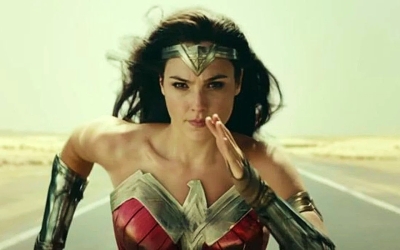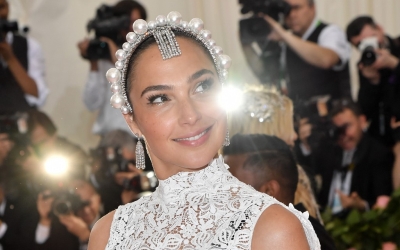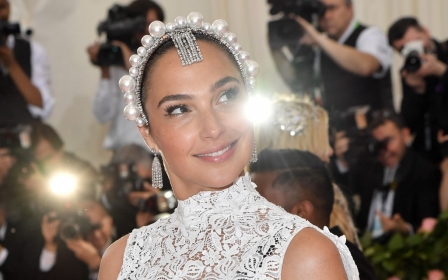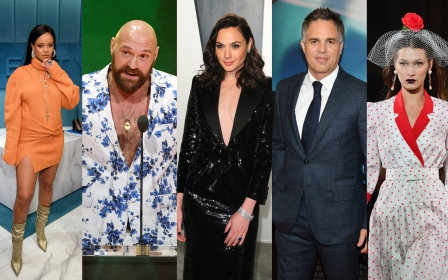Death on the Nile: Scandal-hit Gal Gadot movie hits the screens
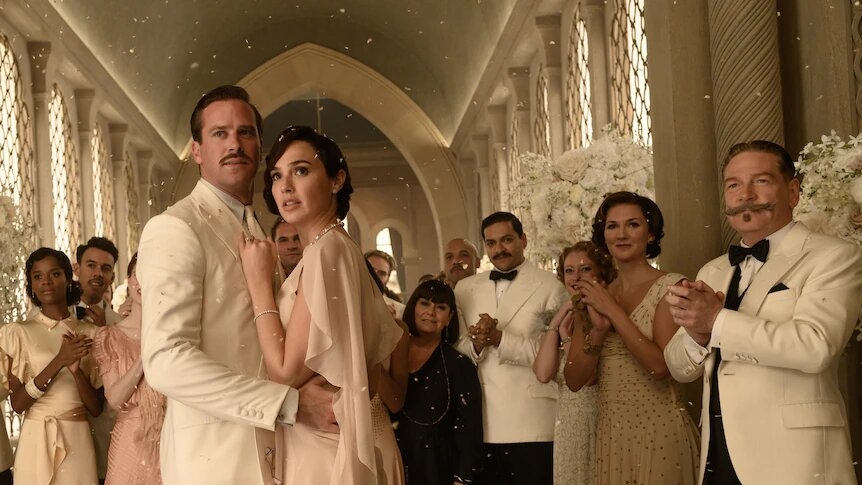
A high-budget Hollywood film with an all-star ensemble cast, based on a much loved novel set in picturesque 1930s Egypt. It should have been a classic.
Instead, Death on the Nile, Kenneth Branagh’s second adaption of a popular Agatha Christie murder mystery, is set for a muted release on Friday following years of delay and controversy.
New MEE newsletter: Jerusalem Dispatch
Sign up to get the latest insights and analysis on Israel-Palestine, alongside Turkey Unpacked and other MEE newsletters
A ban in Kuwait seems like a footnote compared to the scandals involving the movie's cast.
Lead actor Armie Hammer faces rape accusations, which he denies, Gal Gadot's history of support for the Israeli army is another source of controversy, while supporting actors Russell Brand and Letitia Wright have drawn ire for their views on Covid-19 vaccines.
Death on the Nile sees Branagh revive the role of Belgian detective Hercule Poirot, as he sets sail aboard the steamer SS Karnak along the Nile River from Shellal - a small village near Aswan - to Wadi Halfa on the Egypt-Sudan border.
The blissful cruise turns into a hellish nightmare when a couple’s honeymoon is cut tragically short by a murder - with Poirot left to pick up the pieces and interrogate the star-studded suspects on board.
Branagh previously directed and starred in an adaptation of Christie's Murder on the Orient Express in 2017.
Armie Hammer rape accusation
Last year, Hammer was accused of rape, sexual assault and abusive behaviour by multiple women, who alleged that he discussed lurid sexual fantasies ranging from cannibalism to mutilation. The actor denied all allegations, calling them “bullshit claims”.
By the time the accusations had surfaced, Hammer had already filmed all his scenes in Death on the Nile, in which he plays a major role as a key love interest.
Gal Gadot’s latest movie has been banned by Kuwait following a social media protest against the Israeli actress pic.twitter.com/6UYheAIezE
— Middle East Eye (@MiddleEastEye) February 10, 2022
20th Century Studios, a subsidiary of Disney, considered digitally removing the American star, and reshooting all the scenes with a new actor. But that option was considered too expensive and difficult to pull off, with the rest of the all-star cast working on other projects.
Instead, he stayed in the film, which is being quietly released this week. None of the cast, including Branagh, have done any interviews or promotional tours for the film.
Branagh was asked about Hammer whilst promoting the film Belfast, and said that the allegations were “very serious issues [that] are being dealt with very seriously”.
Enough controversy to 'fill the Nile'
Some of Hammer’s co-stars have also caused a stir since the movie went into production.
Actress Gal Gadot, an Israeli army veteran, has been criticised regularly for her perceived silence over Israel's treatment of Palestinians and vocal support for Israel, including during the May 2021 bombardment of Gaza.
Gadot served in the Israeli army during the 2006 Lebanon war, and during the 2014 Gaza war she shared a Facebook post sending “love and prayers” to Israeli military forces, using the hashtag #LoveIDF.
Earlier this week, Death on the Nile was banned in Kuwait, possibly due to those views.
A government official confirmed the ban to AFP, but did not elaborate on the reasoning. Kuwaiti newspaper Al-Qabas reported that it was due to Gadot’s vocal support of the Israeli army.
But her role in Death on the Nile is also subject to memes and mockery that have less to do with her views on the Israeli-Palestinian conflict and more to do with her style of acting.
Gadot - who organised a much lampooned cover of John Lennon’s Imagine at the start of the pandemic - has inspired a deluge of absurdist memes, which zero in on one specific line she delivers in the movie.
"(We have) enough champagne to fill the Nile," Gadot says before tossing a glass of the alcoholic beverage into the river.
Bizarrely that scene has been quoted thousands of times on Twitter and spliced together with scenes from Gadot's other movies.
One viral video purports to show audiences cheering the moment Gadot delivers the line. The post was first shared by a Brazilian man on 10 February, the day the movie was released in the country.
the audience reaction is absolutely sending me… pure fun camp!!! pic.twitter.com/zhImwnqKWT
— Frank Costa (@feistyfrank) February 10, 2022
Indeed it seems the film has enough controversial actors to fill the Nile.
In addition to the allegations against Hammer, supporting stars Russell Brand and Letitia Wright have come under the spotlight for their views on the Covid-19 vaccine.
Brand has increasingly used his Youtube channel to promote vaccine scepticism and condemn vaccine mandates.
Meanwhile, Wright has spread "anti-vax" sentiments on the set of Black Panther 2 according to a report in the Hollywood Reporter, which she denies.
In a separate incident, she shared a video online filled with misinformation about the pandemic and vaccines.
'Colonialist fantasy'
Death on the Nile has received mixed reviews, with some criticising its depiction of Egypt as relying too heavily on stereotypes.
Clarisse Loughrey, writing in The Independent, suggested Branagh had a “tendency to lean into the colonialist fantasy of Christie’s original story".
“He depicts Egypt both as a place of foreboding – where wives are buried alive, and screaming, alongside dead kings – and of pastoral simplicity. The locals will wave heartily as a boat of rich, mostly white, tourists goes by,” she wrote.
“This Egypt – much of it recreated on a soundstage in Surrey, England – has the glossy, vacant look of one of those car park battlegrounds superheroes tend to find themselves in.”
Christie’s novel has long been associated with orientalism, with academics and commentators accusing her of using stereotypes and offhand comments to construct inaccurate ideas of the Middle East and its people.
The British author had a deep fascination with the ancient history of the Middle East, regularly accompanying her archaeologist husband Max Mallowan during excavations in the region.
The inspiration for Death on the Nile came during a 1933 cruise ship on the SS Sudan, which still ferries passengers along the river in Egypt today, and has cabins named after both Christie and Poirot.
This article is available in French on Middle East Eye French edition.
Middle East Eye delivers independent and unrivalled coverage and analysis of the Middle East, North Africa and beyond. To learn more about republishing this content and the associated fees, please fill out this form. More about MEE can be found here.


